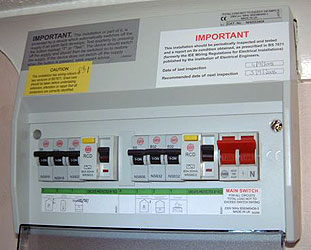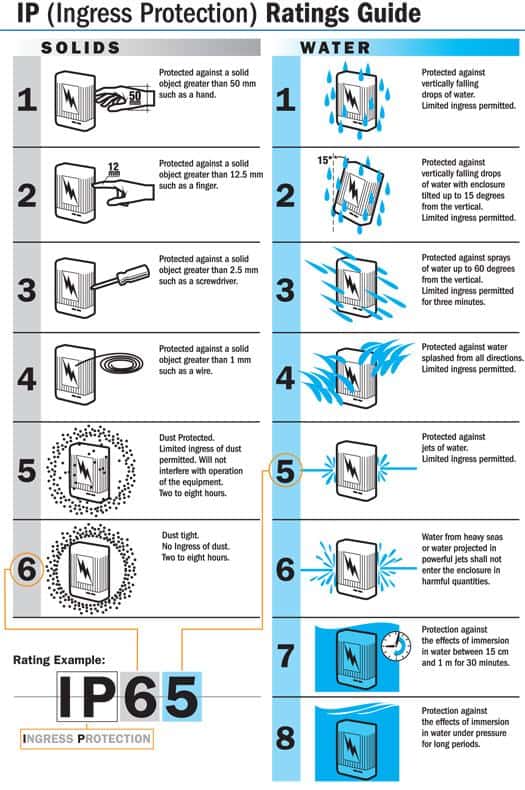When it comes to rewiring your home, it can be an expensive and fairly large job. You might want to rewire your home because of the safety hazards such as damaged or deteriorated wiring. This is an essential part of your home and if not checked on regularly could cause fires. If you’re a landlord, then you have electrical safety obligations to make sure the electrics in your property are safe.

So, the question is, how do you know when rewiring is necessary? There are no rules for this. Simply because the wiring is old, doesn’t mean it is unsafe. Wear and tear can vary depending on the type of wiring, previous usage or if the property has ever had a rodent infestation. Rodents like to chew through cables, so it is worth getting a professional electrician to carry out some electrical testing around your home.
It’s recommended that a periodic inspection is carried out by a registered electrician at least every ten years for an owner-occupied property and five years for a rental property or at the change of tenancy. A professional and qualified electrician will talk to you if your home needs to be rewired and what can be achieved with your specific budget. Contact us today for a free no obligation quotation to get your electrics tested.
If a property is more then 30 years old and has all the original wiring, it’s possible that they need to be updated to meet modern standards. This could include replacing the fuse box with a more modern consumer unit. A sign that a rewire is necessary could be old dated rubber cabling, fabric or lead-insulated cabling. Today electrical wiring is PVCu coated, colored either grey or white and has twin earth.

Outdated and faulty wiring can cause the whole property to trip quite frequently, blow fuses or even worse, cause a lethal house fire or death by electric shock. If you’re considering purchasing an older property, it’ll be worth getting a professional electrician to come and carry out some electrical testing to make sure it’s safe. The electrician will check to see if all the electrics in the house are safe and will provide you with a report. You can then take this into consideration when placing an offer. Even modern homes can have problems, for example, the previous owners have followed a YouTube video on changing a fuse on the fuse board.
Rewiring is an opportunity to not only improve your safety but is also a modern convenience, you could get more switches and plugs installed around the house. If your planning on selling an older property, rewiring your home could boost its appeal and cost to buyers.
If you’re thinking of planning a major renovation project, it is likely that you’ll need to rewire part of your property. Electrical installations must complete with the Building Regulations BS 7672, this is also known as the IET Wiring Regulations. This set of standards for any electrical installation in the UK. All need electrical wiring, regardless if it’s an additional plug socket or an extension is being built, they will need to compliant with the IET Wiring Regulations
The warning signs
If you have an older home and the electrics haven’t been tested for several years, it may be time to get it checked. Signs that you may need to rewire your home include fuse boards tripping regularly, small electric shocks from switches and plug sockets, frequent flickering or dimmer of lights and damaged or exposed wiring and cables.
If you spot any of these warning signs, then you should call out an electrician or if you in live in the Thanet area then look for an electrician in Thanet. Once they have checked over your property, they will give you an estimated cost of having it repaired.
How much does it cost to rewire a house?
A complete rewire of a 3-bedroom house in Thanet will cost around £5,000. A larger property in the area could cost a couple of thousand pounds more. However, a complete rewire can sometimes be avoided if the existing cabling is in a good sound condition and is able to safely complete additional loads. Older installations can be updated by installing a new modern consumer unit. New consumer units can be fitted, tested and certified for roughly £350. When the old fuse box is replaced with a modern consumer unit, it is generally necessary to upgrade the installations earth bonding.
What are the other issues to consider?
When you have your property rewired, it can cause major disruption and so it is best to vacate all the rooms while the work is undertaken. Floor coverings and floorboards may have to be pulled up and channels routed out in the walls as the new cabling cannot be mounted on the surface.
If rewiring is needed, then it should be done before any plastering and decoration are completed. It should also be completed while the plumbing and central heating are installed.
If rewiring is needed, it should be done before any plastering and decoration and around the same time as any plumbing and central heating installation.
Electricity in wet areas

Wet areas such as bathrooms, kitchens and other wet areas, for example swimming pools all have a much greater risk of electrocution. There are special restrictions on electrics in wet areas. For example, shaver sockets much be positioned away from splash areas such as showers and no other sockets are allowed in the bathrooms. Only pull cord switches are permitted in wet areas to help reduce the risk of electric shock.
Electrical appliances in damp areas, such as ventilations fans and light fittings must all have moisture and mechanical protection, also known as Ingress Protection.
Can I do the rewiring work myself?
Rewiring your home is not a DIY job for an amateur, it is extremely important for you and your family’s safety to employ a professional domestic electrician. There are some serious safety implications with poorly installed electrics. Not only could it put you and your family at risk, but your insurance company may not pay out in the event of a fire. It may also be picked up in a survey when you come to sell.
Doing electrical work by yourself is not illegal but it is regulated by law under “Part P” of the Building Regulations. This specifies building work into two different categories: notifiable and non-notifiable. This pretty much distinguishes between major work or work in high-risk areas such as kitchens and bathrooms and, minor work such as adding switches or sockets to existing circuits. If you are carrying out major works, then you must notify your local authority’s building control department.
For any major electrical work, including rewiring, DIYers must belong to one of the Governments approved “competent person” schemes or submit a building notice to the local authority before carrying out the work. For a small fee, you could get one of the local authority inspectors to come and check the work has been completed in accordance with Building Regulations.
I require a professional electrician!
If you require an electrician in Thanet, such as Margate, Ramsgate, Broadstairs, Sandwich, and its surrounding areas then contact us today for a free no obligation quotation. If you outside of this area then you should check to see if the chosen electrician is registered with a regulatory body such as NICEIC, ELECSA or NAPIT and have insurance coverage. You should also ask for an itemised proposal, giving the details of exactly what they propose to carry out and cost.
If you would like to read more of our blogs on the importance of any electrical work or regulations then please click here.
